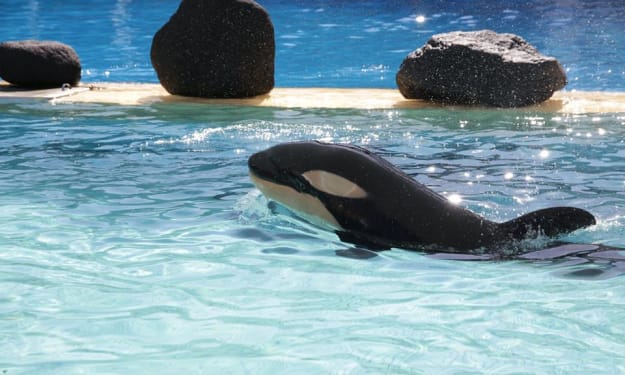Dolphins Like TV?
According to a study that was done on determining how to better improve the lives of dolphins and other animals in human care, it does turn out that enabling the animals to watch some TV might be just as enriching as playing with toys.

Dolphins are known to one of the very few animal species that demonstrate behavioral traits that resemble that of humans. These include establishing complex relationships with other animals, accomplishing common goals, teaching each other basic survival skills that are needed to survive out in the ocean, and even helping out with caring for each other's calves. However, recently, a group of researchers based in Key Largo recently discovered a way on how to enrich dolphins in human care when they are not playing with toys, nor doing public and private training sessions with their trainers—by simply watching a little bit of TV (no joke here).
During the study, researchers Kelly A. Winship and Holli C. Eskelinen recruited eleven bottlenose dolphins and five rough-toothed dolphins to take part in research that would simply involve the mammals watching some TV from the comfort of a glass window to their underwater habitat. Anyway, the researchers decided to treat their marine mammalian subjects to two different television shows—a couple of episodes from the popular BBC show Planet Earth, which did feature other cetacean species and some clips from the Nickelodeon series SpongeBob Squarepants. When discussing the findings from the study, the researchers said that the dolphins, even those who suffer from hearing impairment, did not seem to care about what was being played to them from the glass windows. In fact, the animals were actually captivated by both the realistic imagery of Planet Earth and the animation of SpongeBob Squarepants.
What the researchers found to be very interesting during the study was that male dolphins spent more time watching the screens than their female counterparts did. They would respond to the clips with head jerks, jaw claps, raising their chins, or pressing their foreheads against the screens. Winship and Eskelinen, who published their findings in Journal of Zoo Biology on August 28, 2018 believe that the aggressive behaviors that the animals often showed when they were watching the TV were likely the result of being frustrated that they were unable to physically interact with it.
While there is still a lot to learn about dolphins' TV preferences, researchers do believe that the use of a TV at marine zoological facilities could be used as part of their enrichment programs for dolphins and other animals that are in their care. This may include rescued individuals who have since been deemed "non-releasable" by the federal government. In addition, the researchers also believe that monitoring their response to different kinds of video clips could help provide insight into the thinking process of dolphins and other cetacean species.
At marine zoological facilities, enrichment is a very important part of the lives of marine mammals in human care. It's a multifaceted concept that trainers and veterinarians apply to improve the welfare of their animals through mental stimulation. It's also very critical to the well-being of an animal by promoting the natural behaviors that they would normally display out in the wild like diving, exploring, and hunting. The main goal of animal enrichment, sometimes called environmental enrichment devices (EED), is to keep all animals in human care both mentally and physically fit throughout the day. Some examples of marine mammal enrichment may include pet toys that contain large car wash strips and iced fish, balls, barrels, disks, and water floats. At some facilities, otters might be given live fish to catch in their habitats in order to promote natural hunting behaviors.
With this new research on how to continue to improve the welfare of dolphins and other animals in human care, it is now possible that we can now make TVs an optional EED for animals in order to keep them stimulated throughout the day. Since the dolphins appear to like SpongeBob, is it possible that we could see if they also like Star Wars as well (just being humorous here)?
About the Creator
Jenna Deedy
Zoo and Aquarium Professional, Educator, Cosplayer, Writer and B.A. in Psychology whose got a lot to share when it comes to animals, zoos, aquariums, conservation, and more.
Instagram: @jennacostadeedy






Comments
There are no comments for this story
Be the first to respond and start the conversation.